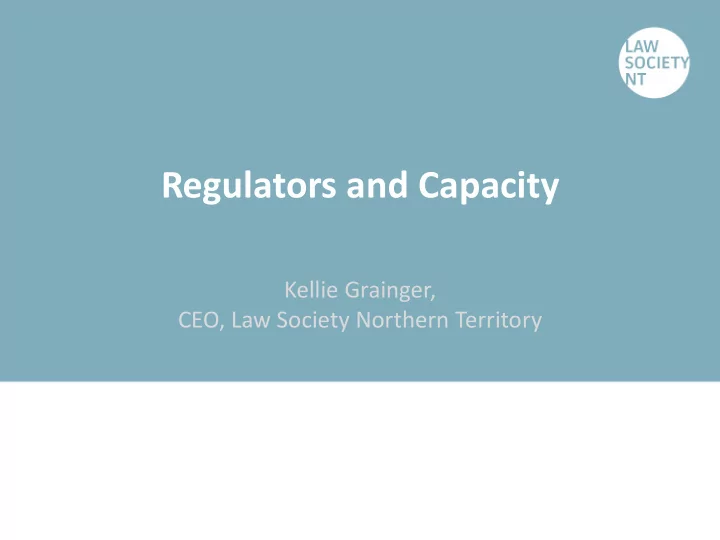

Regulators and Capacity Kellie Grainger, CEO, Law Society Northern Territory
The aging population Older Australia at a glance - Australian Institute of Health and Welfare Web report (Last updated: 10 Sep 2018)
The aging profession National Profile of Solicitors 2016 Report , Urbis, 24 August 2017
The aging profession National Profile of Solicitors 2016 Report , Urbis, 24 August 2017
Shifting sands • Legislative changes – what constitutes a valid Will • Changes to ASCR? • Technology, AI
Beating the curve • Principles about capacity and untainted instructions • Powers of attorney • Inter vivos gifts • Other advice to elderly clients?
Case study ‘Several years ago, we acted for an older person in his 80s, who was blind, frail and elderly. We pursued a financial institution on his behalf, in circumstances where the financial institution had permitted unauthorised withdrawals by a jointly appointed attorney and had permitted a dramatic increase in cash withdrawals from the older person’s account. The older person had moved into an aged care facility into a shared room, because he no longer had cash resources to afford a private room. The matter was resolved with the financial institution without the need to issue proceedings.
Case study ( cont ) The older person’s local solicitor had previously advised him that he should not pursue the financial institution as he would be unlikely to achieve a positive outcome. The older person’s local solicitor was a solo practitioner and did not have an active litigation practice. In that case, had the older person not sought a second opinion he may not have recovered any of his losses and therefore would not have been in a position to move into a private nursing home room.’ LCA Justice Project, Final Report, Part 1, Older Person, page 24
ALRC Recommendation Recommendation 8.1, Elder Abuse — A National Legal Response (ALRC Report 131), 14 June 2017: The Law Council of Australia, together with state and territory law societies, should develop national best practice guidelines for legal practitioners in relation to the preparation and execution of wills and other advance planning documents to ensure they provide thorough coverage of matters such as:
ALRC Recommendation ( cont ) (a) elder abuse in probate matters; (b) common risk factors associated with undue influence; (c) the importance of taking detailed instructions from the person alone; (d) the need to keep detailed file notes and make inquiries regarding previous wills and advance planning documents; and (e) the importance of ensuring that the person has ‘testamentary capacity’— understanding the nature of the document and knowing and approving of its contents, particularly in circumstances where an unrelated person benefits.
What’s out there? • Statement of Principles with Guidelines (LSSA) • Queensland Handbook for Practitioners on Legal Capacity (QLS – with QAI & Allens Linklaters) • When a client’s capacity is in doubt – A practical guide for Solicitors (LSWA) • LIV Capacity guidelines and toolkit • When a client’s mental capacity is in doubt – A practical guide for solicitors (LSNSW) • Client Capacity Guidelines (LSSA)
LCA Justice Report “To enhance expertise across the profession, some Justice Project stakeholders have recommended the incorporation of elder law into the university curriculum as well as improved continuing professional development and training regarding elder law issues for both legal and non-legal service providers. It was proposed that a professional body of lawyers with expertise in elder abuse matters be developed to ‘facilitate referral pathways and make it easier for older persons to find appropriate legal assistance ’.” ( footnotes omitted ) LCA Justice Project, Final Report, Part 1, Older Persons, August 2018, page 27
Recommend
More recommend